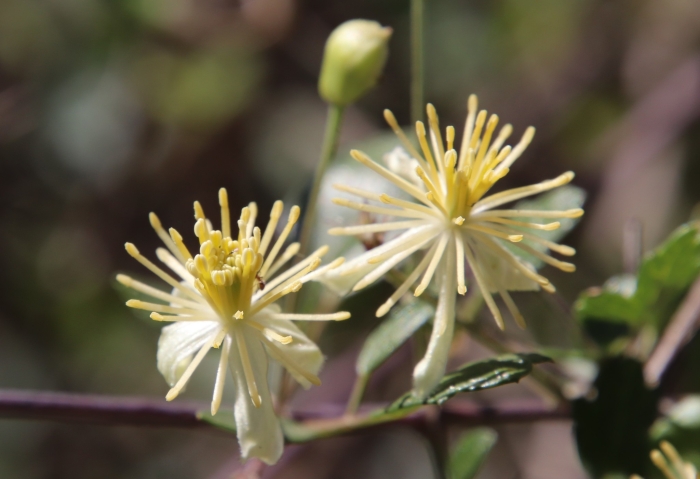Ropevine Clematis
(Clematis pauciflora)
Ropevine Clematis (Clematis pauciflora)
/
/

Millie Basden
CC BY 4.0
Image By:
Millie Basden
Recorded By:
Copyright:
CC BY 4.0
Copyright Notice:
Photo by: Millie Basden | License Type: CC BY 4.0 | License URL: http://creativecommons.org/licenses/by/4.0/ | Rights Holder: Millie Basden | Publisher: iNaturalist | Date Created: 2021-03-01T10:40:53-08:00 |


















































Estimated Native Range
Summary
Clematis pauciflora, commonly known as ropevine clematis, is a perennial woody vine native to the chaparral slopes and desert washes of southern California and Baja California, where it thrives in the arid climate and well-drained soils. It is a climbing plant that can reach lengths of several meters, using its leaf stalks to twine around supports. The vine is characterized by nodes every few centimeters that produce leaves and flowers. Each leaf-bearing node can give rise to an inflorescence of one to three flowers, which bloom from late spring to early summer. The flowers are notable for their narrow petal-like sepals that come in shades of light yellow, creating a delicate appearance. The center of the flower is a dense cluster of up to 50 stamens and a similar number of pistils, which are visually striking and attract pollinators.
Ropevine clematis is valued for its drought tolerance and ability to add vertical interest in gardens. It is often used to cover trellises, fences, and arbors, providing a natural screen or backdrop. This clematis species is adapted to a range of light conditions, from full sun to part shade, and can tolerate various soil drainage types, though it prefers a drier environment. While it requires very low amounts of water once established, it benefits from occasional deep watering during prolonged dry periods. Gardeners should be aware that Clematis species can be susceptible to fungal diseases such as clematis wilt, and they may require pruning to maintain shape and promote vigorous growth.CC BY-SA 4.0
Ropevine clematis is valued for its drought tolerance and ability to add vertical interest in gardens. It is often used to cover trellises, fences, and arbors, providing a natural screen or backdrop. This clematis species is adapted to a range of light conditions, from full sun to part shade, and can tolerate various soil drainage types, though it prefers a drier environment. While it requires very low amounts of water once established, it benefits from occasional deep watering during prolonged dry periods. Gardeners should be aware that Clematis species can be susceptible to fungal diseases such as clematis wilt, and they may require pruning to maintain shape and promote vigorous growth.CC BY-SA 4.0
Plant Description
- Plant Type: Vine
- Height: 5-14 feet
- Width: 5-14 feet
- Growth Rate: Moderate
- Flower Color: White, Yellow
- Flowering Season: Spring, Winter
- Leaf Retention: Deciduous
Growth Requirements
- Sun: Full Sun, Part Shade
- Water: Very Low
- Drainage: Fast, Medium, Slow
Common Uses
Bee Garden, Bird Garden, Butterfly Garden, Deer Resistant, Fragrant, Hummingbird Garden, Low Maintenance, Rabbit Resistant, Showy Flowers
Natural Habitat
Chaparral slopes and desert washes
Other Names
Common Names: Small Leaved Clematis, Virgin’s Bower, Ropevine
Scientific Names: , Clematis pauciflora, Clematis lasiantha var. pauciflora, Clematis nuttallii, Clematis parviflora,
GBIF Accepted Name: Clematis pauciflora Nutt. ex Torr. & A.Gray